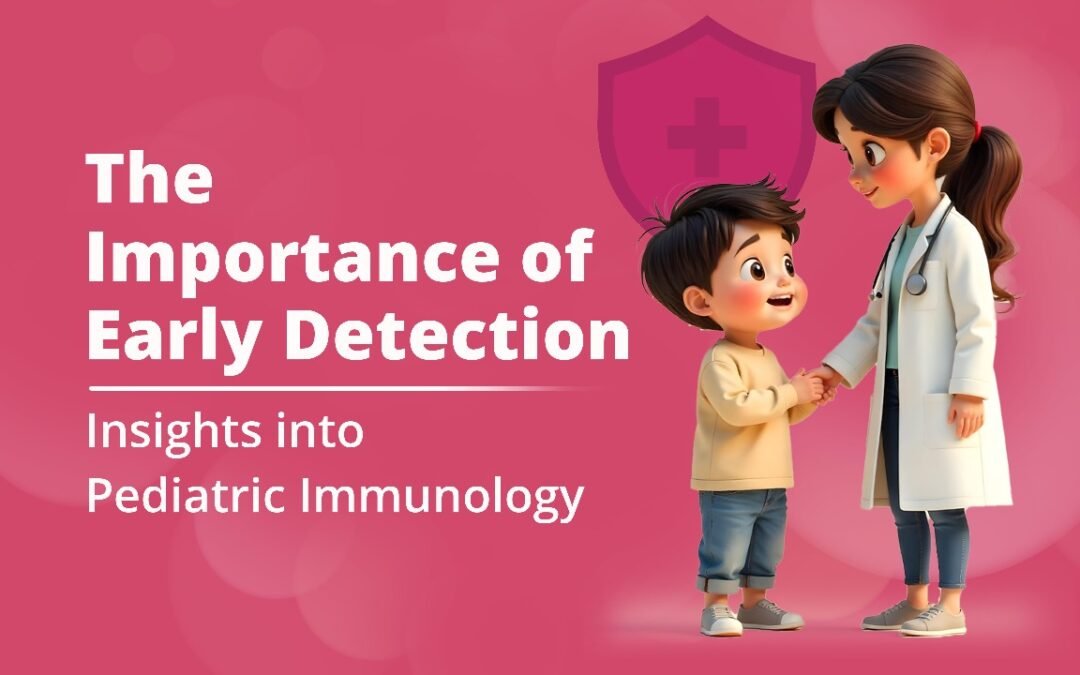In the intricate world of pediatric healthcare, understanding the role of immunology is paramount. As children grow and develop, their immune systems play a crucial role in protecting them from infections, diseases, and other health challenges. In this blog, we delve into the significance of early detection in pediatric immunology, shedding light on why proactive measures are vital for ensuring the well-being of children.
Understanding Pediatric Immunology:
Pediatric immunology focuses on studying the immune system in children, encompassing its development, function, and response to various pathogens and environmental factors. From infancy through adolescence, children undergo significant changes in their immune systems, making them susceptible to different diseases and infections.
Importance of Early Detection:
Early detection of immune system disorders and abnormalities is essential for several reasons. Firstly, it allows healthcare providers to identify potential health risks and intervene promptly, preventing the progression of diseases or complications. Secondly, early detection enables the implementation of preventive measures, such as vaccinations and lifestyle modifications, to bolster the child’s immune system and reduce the risk of infections. Additionally, early detection facilitates timely access to specialized care and treatment, optimizing outcomes and improving the quality of life for children and their families.
Common Pediatric Immunological Disorders:
Several immune system disorders can affect children, ranging from autoimmune conditions to primary immunodeficiencies. Autoimmune disorders occur when the immune system mistakenly attacks healthy tissues, leading to inflammation and tissue damage. Examples include juvenile idiopathic arthritis (JIA) and autoimmune hepatitis. On the other hand, primary immunodeficiencies are genetic disorders characterized by impaired immune function, making children more susceptible to infections. Disorders like severe combined immunodeficiency (SCID) and X-linked agammaglobulinemia (XLA) fall under this category.
Early Signs and Symptoms:
Recognizing the early signs and symptoms of immune system disorders is crucial for timely intervention and management. Symptoms may vary depending on the specific disorder but can include recurrent infections, unexplained fevers, chronic fatigue, slow growth or development, and autoimmune-related symptoms like joint pain, rashes, or gastrointestinal issues. Parents and caregivers should remain vigilant and consult healthcare professionals if they notice any concerning symptoms in their children.
Diagnostic Approaches:
Diagnosing pediatric immunological disorders often involves a comprehensive evaluation, including medical history assessment, physical examination, and laboratory tests. Blood tests, imaging studies, and specialized immune function tests may be conducted to assess the child’s immune system function, identify specific antibodies or immune cells, and rule out other underlying conditions. In some cases, genetic testing may be necessary to confirm a diagnosis of primary immunodeficiency.
Treatment and Management:
Treatment strategies for pediatric immunological disorders aim to alleviate symptoms, prevent complications, and improve the child’s quality of life. Depending on the diagnosis, treatment may involve medications to modulate the immune response, such as immunosuppressants or immunomodulators, intravenous immunoglobulin (IVIG) therapy to boost immune function, or biologic therapies targeting specific immune pathways. Additionally, lifestyle modifications, dietary changes, and supportive care measures may be recommended to optimize the child’s overall health and well-being.
Early detection plays a pivotal role in pediatric immunology, enabling healthcare providers to identify and address immune system disorders promptly. By recognizing the early signs and symptoms, parents and caregivers can advocate for their children’s health and seek timely medical attention when needed. Through proactive measures, including vaccinations, regular screenings, and adherence to treatment plans, we can safeguard the health and vitality of our children, fostering a future where every child thrives in optimal health and well-being.
Please note: It’s important to note that this blog is for informational purposes only and should not be taken as medical advice. If you have any concerns about your child’s health, please consult a healthcare professional.

